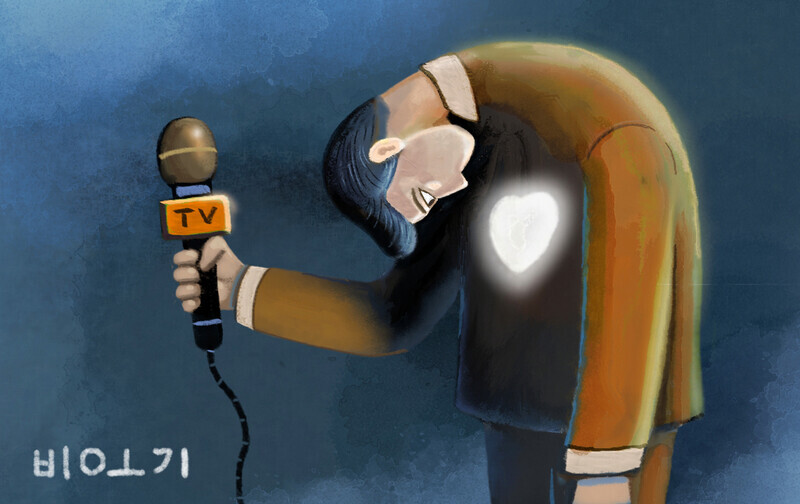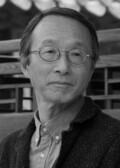hankyoreh
Links to other country sites 다른 나라 사이트 링크
[Column] The fall of Korean journalism

We all accept that the first duty of journalism is to seek the truth. The problem is how very confusing the truth can be. It takes on a different form for each different perspective. For the media, truth begins with an act of “finding” the right truth. In South Korea’s case, the days of dictatorship were a time when reporters could not even properly report the facts; the facts themselves were “the truth.” Sensing shame in the face of concealed truths, reporters sought to bring them to light, only to end up fired, tortured, and imprisoned.
The Hutchins Commission, a group of media scholars, warned of the dangers of news that reports the “facts” yet ultimately conceals the truth. This warning reminds us that facts need a certain something to get closer to the truth. The events and things the journalist sees and hears through sources are simply a pile of information. As that pile is verified and categorized, and as those categorized things are arranged in different ways, facts can be distorted or transformed into falsehoods, and they can take a step toward truth. The process of finding the truth in facts is a journey of sorts. The more transparent and passionate that journey is, the closest we can get to the truth. In this sense, the journalist is a lone traveler. The journalist’s soul leads a solitary existence.
The mass protests of the June Struggle, the culmination of South Korea’s painful democratization, launched the country’s media into a completely new environment. As the dictatorship fell, we found ourselves on a path toward being able to find not simply facts, but the truth. It is a path at once close and distant, gentle and perilous, brightly lit and as dark as an abyss. The truth appeared simple in the days when it was concealed — but when uncovered we realized it was not so simple. Thirty-three years later, Korean media finds itself in a strange position as it tries to uncover this truth.
High press freedom but low public trust in mediaThe 2020 World Press Freedom Index by Reporters without Borders put the South Korean press in 42nd place — the highest ranking in Asia. Having previously plummeted from 31st place in 2006 to 70th in 2016, it began to bounce back in 2017. But the Reuters Institute for the Study of Journalism at Oxford University ranked the Korean press among the lowest of 40 major countries examined in terms of trust. It’s a skewed state of affairs where the press ranks high for freedom, but trust is at rock-bottom levels. A low level of trust means that in many of the articles, “facts” are being distorted or turned into falsehoods. How did this come about?
While there is a complex mixture of factors, one that must be mentioned is how excessively partisan the press is. A product of media identity and political philosophy, the partisan nature of the press is particularly evident in the “legacy media.” We’ve seen a sharp rise in the number of articles containing distortions and falsehoods — so many that “fact checking” has become part of our everyday vocabulary.
A community’s language is like lifeblood, in that it needs to flow naturally to every part. The press is a central blood vessel for the community. A blockage in that vessel has negative effects on the blood flow in other vessels. This is why South Korea’s partisan media is so dangerous. This deepening partisan trend is closely tied to media companies being used as a tool for personal power. Freed from the fetters of political authority after democratization, the press was swallowed by business interests, imperiling the process leading from facts to truth.
A reporter for Channel A, part of that legacy media, allegedly used connections with a senior prosecutor to extract details about a Democratic lawmaker’s improprieties from a businessperson serving time for financial fraud. What makes this case of collusion between the prosecutors and press so shocking is how closely connected it is with the distorted nature of South Korea’s media.
Last November, the Law Press Club administered a survey to 99 legal reporters. The results showed 94% of them holding negative views about Minister of Justice Choo Mi-ae’s decision to invoke her authority to direct investigations, and 83.8% sharing negative assessments of prosecutorial appointments. Also, 84.8% of them disapproved of the Channel A reporter’s investigation tactics, and 82.8% voiced negative views on the Channel A investigation; 61.6% disapproved of the establishment process for the Corruption Investigation Office for High-ranking Officials (CIO).
When we consider how the press is a living, breathing organism within its social context, these findings appear downright bizarre; the gap between press coverage and public perception is simply too wide. It’s worrying enough that 61.6% of law reporters objected to the CIO’s establishment when various polls of the South Korean public have found high rates of support in the 60-90% range. But if 84.8% of respondents disapproved of the Channel A reporter’s methods, does that mean the remaining 15.2% were of the view that such tactics are acceptable? It’s difficult to comprehend.
Public rights vs. press freedomThe Law Press Club survey findings lend credence to critics who argue that the reporters who cover the prosecutors exist in an inappropriately symbiotic relationship with the officials in charge there, printing articles based on information and announcements provided by the prosecutors without even a bare minimum of fact checking. It’s a criticism that the reports need to take to heart -- for the human rights of suspects in need of protection are violated when reporting biased in the prosecutors’ favor omits the voices of the suspects those prosecutors are investigating. This irony -- the same press that gained its freedom through democratization is now trampling on the human rights that represent the foundation of democracy -- reminds us anew of how difficult democracy can be. The reason the community supports freedom of the press is because of the public’s right to know. When press freedoms end up damaging the public’s right to know, they lose their grip on their very reason for being.
This grim spectacle of the value of facts and weight of truth becoming diminished -- of words floating about in a vacuum -- calls to mind the classic words of Walter Lippmann, who said, “The present crisis of Western democracy is a crisis of journalism.” Called the “father of journalism,” Lippmann was demanding perfection, accuracy, and diligence from the press in his belief that “the most destructive form of untruth is sophistry and propaganda by those whose profession it is to report the news.” As a result, the media has created what Lippmann termed the “most poisonous form of disorder”: the “mob incited from high places.”
For reporters, language is like an organism. An organism is a being with a purpose. The instant that the organism becomes a means rather than an end, its value collapses. This is the degradation of language. The partisan biases of journalists cannot occur without a degradation of language. Similarly, the degradation of language cannot occur with the degradation of reporters’ souls. Media bias exists in just such a relationship of degradation with the reporter’s soul. What is so frightening about the degradation of the press is how it degrades the community’s language -- and thus sickens the community.

By Jung Chan, novelist
Please direct comments or questions to [english@hani.co.kr]

Editorial・opinion
![[Column] Season 2 of special prosecutor probe may be coming to Korea soon [Column] Season 2 of special prosecutor probe may be coming to Korea soon](https://flexible.img.hani.co.kr/flexible/normal/500/300/imgdb/original/2024/0426/3317141030699447.jpg) [Column] Season 2 of special prosecutor probe may be coming to Korea soon
[Column] Season 2 of special prosecutor probe may be coming to Korea soon![[Column] Park Geun-hye déjà vu in Yoon Suk-yeol [Column] Park Geun-hye déjà vu in Yoon Suk-yeol](https://flexible.img.hani.co.kr/flexible/normal/500/300/imgdb/original/2024/0424/651713945113788.jpg) [Column] Park Geun-hye déjà vu in Yoon Suk-yeol
[Column] Park Geun-hye déjà vu in Yoon Suk-yeol- [Editorial] New weight of N. Korea’s nuclear threats makes dialogue all the more urgent
- [Guest essay] The real reason Korea’s new right wants to dub Rhee a founding father
- [Column] ‘Choson’: Is it time we start referring to N. Korea in its own terms?
- [Editorial] Japan’s rewriting of history with Korea has gone too far
- [Column] The president’s questionable capacity for dialogue
- [Column] Are chaebol firms just pizza pies for families to divvy up as they please?
- [Column] Has Korea, too, crossed the Rubicon on China?
- [Correspondent’s column] In Japan’s alliance with US, echoes of its past alliances with UK
Most viewed articles
- 1Samsung subcontractor worker commits suicide from work stress
- 2‘We must say no’: Seoul defense chief on Korean, USFK involvement in hypothetical Taiwan crisis
- 3Is Japan about to snatch control of Line messenger from Korea’s Naver?
- 4Division commander ordered troops to enter raging flood waters before Marine died, survivor says
- 5[Editorial] Korea’s surprise Q1 growth requires objective assessment, not blind fanfare
- 6No good, very bad game for Korea puts it out of Olympics for first time since 1988
- 7US overtakes China as Korea’s top export market, prompting trade sanction jitters
- 8Korea’s 1.3% growth in Q1 signals ‘textbook’ return to growth, says government
- 9N. Korean delegation’s trip to Iran shows how Pyongyang is leveraging ties with Moscow
- 10[Column] Season 2 of special prosecutor probe may be coming to Korea soon